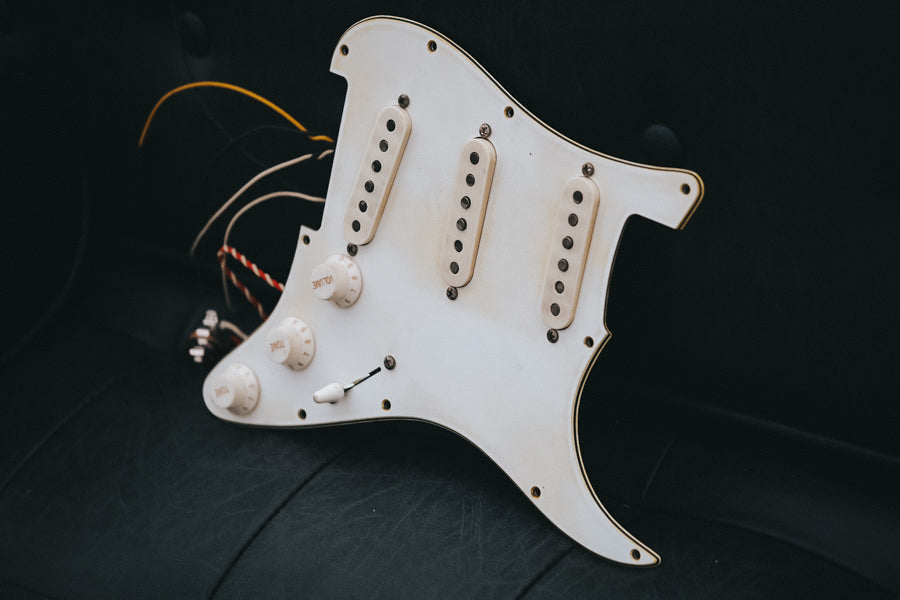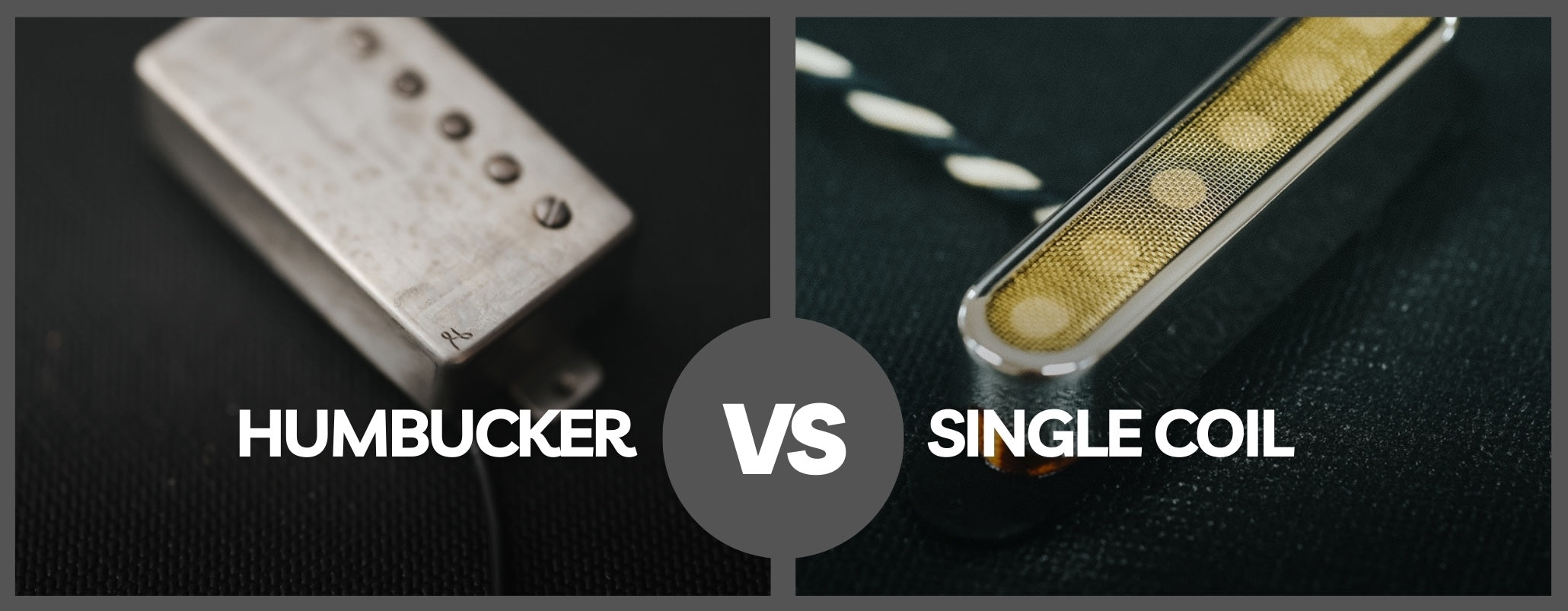
How to Get a Good Guitar Tone

How to Get a Good Guitar Tone
Playing the guitar is more than just a hobby or a form of expression—it's a journey. And on that journey, few things are more impactful and compelling than your guitar tone. From the moment you strike your first chord, the tone you produce has the power to inspire, motivate, and at times even frustrate. Many new guitar players make the mistake of thinking that choosing a guitar is simply about looks or fitting within a budget. But the truth is, the sound you create—the guitar tone you shape—is what truly defines your experience as a guitarist.
That’s why I wanted to put together this simplified guide on how to get a good guitar tone. Whether you're playing through a vintage tube amp, crafting ambient swells with wet effects on Sundays, or ripping power chords with high gain, the goal is the same: to sound incredible and to feel connected to your music and move your audience of one (maybe its your dog at home like me), or its tens of thousands of fans in an arena. Let’s dig into what makes great tones happen and how you can improve your tone in ways that actually matter.

What You Need to Understand How to Get a Good Guitar Tone
When we talk about guitar tone, we're not just talking about sound—we're talking about the soul of your playing. Understanding what makes a good guitar tone and how to shape it can completely transform your playing experience AND how you impact your audience.
If you're a guitar player trying to dial in that perfect amp sound, learning how tone controls work, experimenting with guitar volume, choosing heavier strings for more string tension, or adding delay effects pre or post the amp—you’re already on the journey of chasing better tone. This post will help you understand what guitar tone really is, what it does, what influences it the most, and most importantly, how you can get a good tone on electric guitar consistently.
Whether you play electric guitar in the bedroom, on a church platform, or aspire to record world-renowned guitar lead lines on hit records, this guide is going to give you strategies to improve your tone and make your amplifier or studio speakers sound inspiring.

What Is Guitar Tone?
Guitar tone refers to the overall sound character your guitar playing produces. It's influenced by a variety of components including your playing technique, gear setup, and how the signal is produced by a magnetic field activated by your fingers touching the strings (but more on that later), and makes its way through the circuit to an amplifier speaker.
Your tone is what people hear when you play. It’s why you can instantly recognize the searing crunch of Billy Gibbons, John Mayers blues-infused articulate yet overdriven tones, or the chimey, overdriven, and spacious reverb and delay inflused tones of a modern worship guitarist. The tone isn't just about volume and tone knobs on your guitar; it's a combination of how your pickups interact with the magnetic field, how your amp circuit reacts to the amplitude of your playing, and how all your gear works together.
In short, your guitar tone is your voice, and shaping that voice is a skill you can develop.
What Does Tone Do On A Guitar?
Defines Your Musical Style:
Your guitar tone communicates your genre, style, and intent. Whether it’s the raw grit of high gain metal or the clean sparkle of indie pop, your tone is your fingerprint.
Enhances or Limits Expression:
Poor tone can mask dynamics, note articulation, or subtle playing nuances. Great tones help every detail shine, from harmonics to ghost notes, intonation from finger pressure to string bending technique.
Influences Band Mix:
The right tone helps your electric guitar sit well in a mix. Whether you're avoiding frequency clashes with the bass guitar, keys, vocal frequencies, or just letting your solos soar above them all, your base guitar tone makes all the difference.

What Makes The Biggest Influence On Guitar Tone?
This is by far the most asked question by electric guitarists, whether they're brand new to playing or are a studio rat not sacrificing anything for tone perfection. A good guitar tone is the sum of many parts—just like a great vehicle isn’t only about sleek looks, but also the combination of quality components and reliable engineering. It’s not just about getting from point A to point B—it’s about doing it with style, speed, comfort, and consistency. The same goes for tone: it’s the total experience that makes your playing feel stand out.
Guitar tone has many parts that all play a role, so lets explore some of the ones that make a direct impact to your sonic experience, highlighting the biggest tone benefitting upgrades, the biggest tone killers, and perhaps even more interesting - the biggest tone myths.
Do My Hands Affect Tone?
Tone starts with your fingers. The way you pick, strum, or fret each note has a huge impact on your overall sound. Why is that? We’ll dig into the details later, but for now, know this: to become a great guitar player, you need to intentionally work on your dynamics, touch, and attack. Great players don’t just play notes—they feel them. Try challenging yourself to play the same phrase with varying levels of intensity. You’ll quickly realize that your note attack can shape how your tone is perceived, adding emotion and depth to every line.
Does Guitar Nut Affect Tone?
The nut material can influence sustain and clarity, especially for open notes. Bone and brass nuts are known for their bright, articulate qualities. That said, the nut has more of an impact on the tuning stability than anything else - and a cheap plastic or improperly cut nut of any material will significantly decrease your ability to stay in tune, especially if using a trem system like a Bigsby, Vega-trem, or floating strat trem.
Do Guitar Cables Affect Tone?
Yes, they can. Cheap or long unbuffered cables degrade high frequencies. The longer your unbalanced signal travels from the guitar through the effects loop to the amplifier the most signal loss you'll experience. To minimize this, look for low-capacitance cables to preserve the clarity of your sound and if you are using a pedalboard, make sure your signal is buffered and powered by a high quality isolated power supply unit for every effects pedal.
Does Guitar Weight Affect Tone?
Heavier guitars often have more sustain due to denser woods, which can also make them less resonant in the high end. Resonance and sustain are two variables that have their place at the tone table, but for electric gutiars and bases, it's more important to have the instrument feel comfortable for your playing style and context than to find a Telecaster that is less than 5.5lbs or a Les Paul that is more than 7lbs.
Does Guitar Wood Affect Tone?
Ah, now we've finally arrived at the question of all electric guitar tone questions: Does tonewood matter? For electric guitars and bases, not really. The truth is, it's complicated; mahogany is said to provide warmth and sustain. Alder is supposedly balanced. Maple is projected to be bright. A red nitrocellulose lacquer finish is supposedly the "more transparent".... most guitar manufacturers intentionally balance their wood choice qualities for the desired effect, using it as a marketing tool to describe the kind of tones their custom made guitar or bass will be able to produce. These variables are the highest priority when it comes to acoustic instruments, but within the electric guitar and bass categories, they take a back row seat in the theatre. There is one component category that make the biggest impact on guitar tone, so lets talk about it.

Do Guitar Pickups Affect Tone?
More than 90% of tonal quality is directly dependent on the quality of your pickups. The amplified signal from your guitar is produced by interrupting the guitar pickup(s) magnetic field. When you strum a string on your electric guitar or bass, you create a vibration or a frequency wave with a ferrous metal (guitar string). When a ferrous metal interferes with a magnetic field with a coil wrapped around it, you generate a REALLY tiny voltage signal. That signal then travels through your guitar controls (volume pot, tone circuit, capacitor, etc etc to the output jack, which connects to your 1/4" instrument cable, then to your pedal board where that signal gets manipulated by dynamics-based pedals (compressor, volume, buffer, etc) into your gain based stage, into modulation effects, then your time or wet effects, and finally out to an amplifier, which with AMPLIFY your tiny little signal into something that we love to hear and the qualities that try and emulate from our favorite records.

Guitar pickups are disproportionately more important in shaping the tone of your electric guitar or bass. They're responsible for producing the raw signal that eventually becomes the amplified sound you hear. Yet, most guitars under $1500 come equipped with mass-produced, imported pickups and electronics that suffer from loose manufacturing tolerances, low-grade wire, inconsistent winding tension, poor or low-grade magnets, and more. We’ll dive deeper into how each of these factors affects pickup quality in future blog posts. But here's the bottom line: if you drop cheap pickups into a high-end PRS with premium wood and craftsmanship, the tone will still fall flat—especially compared to a budget guitar loaded with well-made pickups.

If you want to see how much wood plays a role in the final tone quality, check out this YouTube video by a Nashville-based session guitar player who decided to test this sacred cow issue.
So what does this really mean? Does that mean guitar wood doesn’t matter at all? Not quite. There’s a strong connection between quality tonewoods, solid construction methods—like a set neck versus a bolt-on—and how an instrument feels and responds when you play. These factors, along with things like resonance and sustain that we touched on earlier, all play a role in shaping the overall experience. In addition, resonance and sustain DO make an impact on how the strings vibrate, which does have an impact in how the pickup creates its signal when the magnetic field is disturbed.

How To Get A Good Tone On Guitar
Guitar tone is a sum of its parts. Pickups, by far, make the biggest impact in your baseline guitar tone, over 90%. The remaining 10% are variables we discussed above like nut type, wood/body type and construction, signal quality and cable capacitance tolerances. Additional ones to be aware of are bridge saddle materials, wiring harness components like the potentiometer values, quality resistors and capacitors, clean solder joints, and clean grounds. All of those variables should be considered before the signal even leaves the guitar! Then, it's manipulated in many ways, such as with pedals, cables, filters, EQs, amplifier circuits, and finally, a speaker choice.

Bonus Tip: Use the Right Tools
If you’re ready to take control of your sound, make sure you have the right gear on hand to make those changes as easy as possible. Check out our post about Tech Tools to make setup and maintenance easy.
Love Your Tone
A good guitar tone doesn’t happen by accident. It’s the product of intentional decisions, critical listening, and a little bit of experimentation. From the guitar pickups to the tone controls on your electric guitar to the way you shape your amp sound or choose a pick vs finger plucking; every element adds up.
So take your time. Explore. Refine. Learn to train your ears by hearing and emulating guitar tones that inspire you from other players. Because once you find the tone that speaks to you, your playing will never be the same.
Now plug in, save up for a pickup upgrade, and go love your tone.
If you're curious about what your tone could be like with Lambertones Pickups installed, you can check out our best selling single coils pickups and our best selling humbucker pickups here, we are excited to welcome you to the family!



Leave a comment
This site is protected by hCaptcha and the hCaptcha Privacy Policy and Terms of Service apply.